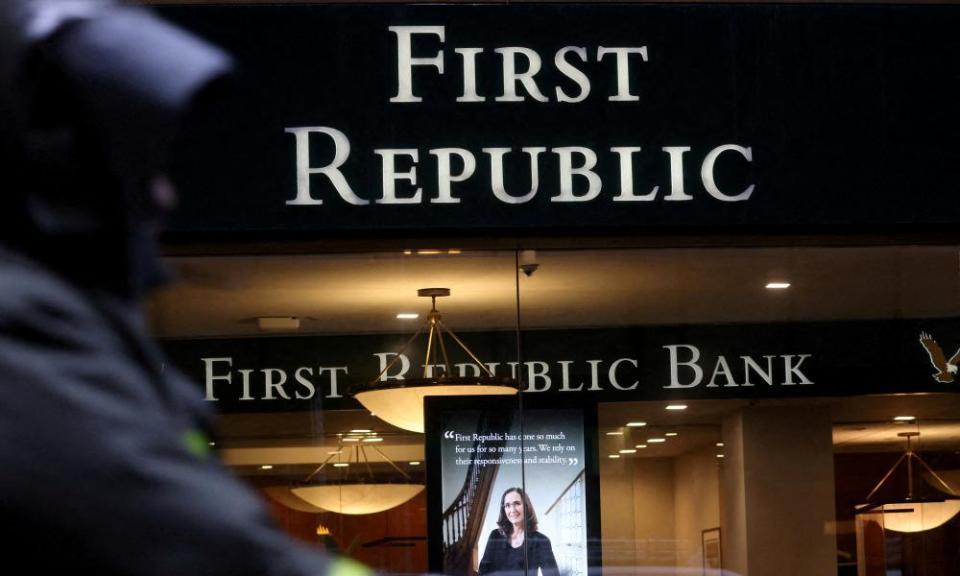First Republic’s shares crash more than 46% after downgraded credit rating

Shares in troubled First Republic Bank crashed more than 46% on Monday, after reports the San Francisco-based bank may need to raise more funds despite a $30bn (£24bn) rescue last week.
As the growing banking crisis spread into a new week, the credit rating of the regional bank was downgraded deeper into junk status by S&P Global. The agency said that the bank, which caters to wealthy clients, probably faced “high liquidity stress with substantial outflows”.
US officials are studying how to temporarily expand the protection offered to banking customers by Federal Deposit Insurance Corp (FDIC) to include all deposits, going beyond the current $250,000 cap, Bloomberg reported on Monday night.
Like the collapsed Silicon Valley Bank (SVB), a large proportion of First Republic’s customers hold more than the $250,000 amount guaranteed by federal insurance.
However, the move may face political roadblocks. Hardline Republicans in the House of Representatives on Monday vowed to oppose any cover extension.
The Republican House Freedom Caucus said in a statement: “Any universal guarantee on all bank deposits, whether implicit or explicit, enshrines a dangerous precedent that simply encourages future irresponsible behavior to be paid for by those not involved who followed the rules.”
First Republic’s woes follow the collapse of SVB and New York-based Signature. Over the weekend Credit Suisse became the largest institution so far to be embroiled in the upheaval when the Swiss government forced the troubled bank into a cut-price takeover by rival UBS.
First Republic has struggled to reassure depositors that it will not suffer the same fate as SVB and Signature. Last week, the bank increased borrowings from the US Federal Reserve and then suspended its common stock dividend despite holding about $213bn in assets and $176bn in deposits.
Related: UK and US shares climb as banks and ministers aim to calm Credit Suisse fears
On Sunday, Reuters reported that the lender was still trying to put together a deal to raise capital, days after 11 of the biggest names in US banking, including JPMorgan Chase, Citigroup, Bank of America and Goldman Sachs kicked in $30bn.
Efforts to provide new support to First Republic are being led by the JP Morgan CEO, Jamie Dimon, the Wall Street Journal reported.
In a regulatory filing, the First Republic executive chairman, Jim Herbert, and the CEO, Mike Roffler, said the cash injection “is a vote of confidence for First Republic and the entire US banking system”.
But First Republic’s shares have lost 80% of their value over the past 10 days on fears of a bank run. About 70% of First Republic’s deposits are uninsured, well above a 55% average for medium-sized banks, a figure that puts the bank third after SVB (94%) and Signature Bank (90%), according to Bank of America.
The Journal also reported on Friday that First Republic’s lending business “revolves around making huge mortgages to such clients as Mark Zuckerberg”. Dependence on property, personal and commercial loans concerns analysts as they cannot be rapidly liquidated.
But despite guarantees from US banking officials and the US president, Joe Biden, that all deposits in midsize banks are safe regardless of amount, First Republic has seen large outflows of deposits, estimated at $70bn since SVB collapsed 10 days ago. In a regulatory filing, the bank said borrowings from the Federal Reserve had varied from $20bn to $109bn from 10 March to 15 March.
“People are doing something that probably is not rational but totally understandable, which is them moving deposits,” Mohamed El-Erian, an economist and president of Queens’ College at the University of Cambridge, told Bloomberg. “Where are they moving deposits out of? The smaller and regional-sized banks into the larger banks,” he added.
But it has been widely noted that the very banks that stepped in to support the bank are also the banks that stand to benefit from wealthy depositors now removing the money.
On Monday, CNBC reported that First Republic had hired an investment bank to advise it on potential options but a $25bn hole in its balance sheet remained a hurdle for any deal. The bank’s continued share decline comes as other midsize or regional banks have seen their share values rise modestly.

 Yahoo Finance
Yahoo Finance 